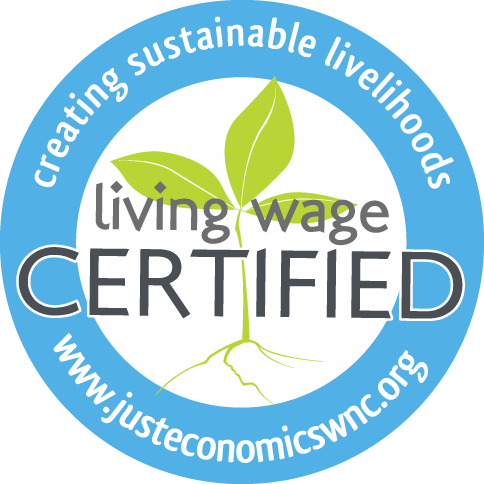The cost of living in Asheville and the surrounding area has been a regular topic of conversation on social media, in the press, and around our office.
At Just Economics, we run a voluntary Living Wage Certification Program that certifies (and then recertifies every two years) employers who voluntarily pay at least a living wage. We determine the living wage in Buncombe County using a formula that is based on the cost of housing.
Like everything in the past year, we have had to make adjustments in our program. Since the COVID-19 crisis began, we have seen many local businesses struggle, some closing their doors, without the safety net that multinational corporations have. So naturally, many business owners who have worked hard to take care of their employees by keeping up with the living wage were surprised as our living wage rate for employees without benefits rose from $13.65/hr in 2019 to $15.50/hr in 2020 and then $17.30/hr in 2021. How could we possibly expect small businesses to keep up with these rising labor costs in the midst of a pandemic and the economic crisis that has resulted for so many industries?
This brings up an important question—who is responsible for the rising cost of living? Historically, the answer has been workers. Let me explain.
Even in the midst of a global pandemic, costs for workers have risen over the last year. Service industry workers, among others, have often seen reductions in hours or unpaid time off due to quarantining; yet the cost of housing, the largest expense for many, has not decreased. So even while many workers have seen their income decline, their expenses haven’t. In fact, workers have been experiencing the real value of their wages decline while expenses have risen for years.
If you live in a household that rents, do you remember what the rent was in 2009? That’s the last time the federal minimum wage increased to $7.25. That’s right, the minimum wage has remained the same for the last 12 years, while both median home prices and Fair Market Rent for a 2 bedroom apartment according to HUD have more than doubled over the same period. In fact, according to data available from the Board of Realtors, average home prices were up 19% this February from what they were just one year ago, while many of the essential workers keeping us supplied and fed through the pandemic have not seen a raise in years and are still not making $15/hr.
So when wages don’t rise at the same pace as the cost of living, workers assume that burden and are expected to absorb the increased cost of living. Workers end up doing the same amount of work for relatively less money over time, when you consider inflation-adjusted wages. In fact, the minimum wage was at its height in real value in 1968. Since then worker productivity per hour has increased, CEO pay has increased, income inequality has increased but the real—inflation adjusted—value of the minimum wage has lost significant ground.
So is it fair for the responsibility of absorbing the rising cost of living to fall on workers? No. It also isn’t fair for small businesses to share in that burden alone.
What if we all took responsibility for the increase in cost of living? What if we said goodbye to Amazon and all chose to support local businesses or living wage employers when we were able to even if it costs slightly more or was a little less convenient? What if local, state, and the federal governments put in place policies that contributed to the growth of affordable housing and helped mitigate cost of essential needs like food, housing, childcare, healthcare and transportation? What if all businesses prioritized living wages and businesses owners did not have to worry about having their prices undercut because their competitor was paying poverty wages? What would it look like if it was all of our responsibility to absorb the rising cost of living in our community?
COVID-19 has wreaked havoc on so many things, including our local economy. So much has changed over the last year – maybe now is the perfect opportunity to consider how we re-shape our local economy moving forward. It is possible for workers, small business owners and our community in general to thrive together? Let’s not let this moment pass without considering how we co-create a more just and sustainable local economy together.
Op-ed published in the Asheville Citizen Times May 9th, 2021. https://www.citizen-times.com/…/opinion…/4943407001/


